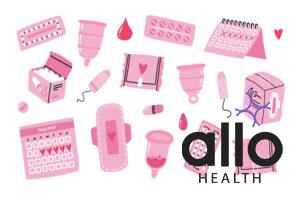Using Crina NCR 10 mg for Managing Periods

Allo Health is dedicated to personalized well-being, offering support and trusted information tailored to individual health goals. The platform emphasizes human-generated content, led by a distinguished medical team of experts, including physicians and sexual health specialists. Their commitment to credibility involves rigorous fact-checking, authoritative research, and continuous updates to ensure accurate, up-to-date information. Allo Health's unique approach goes beyond conventional platforms, providing expert-led insights and a continuous commitment to excellence, with user feedback playing a crucial role in shaping the platform's authoritative voice.

Dr.Sushma.V completed MBBS degree from BGS GIMS,bangalore
Why This Was Upated?
Our experts continually monitor the health and wellness space, and we update our articles when new information became available.
Updated on 15 April, 2024
- Article was updated as part of our commitment to diversity, equity, and inclusion.

"The following blog article provides general information and insights on various topics. However, it is important to note that the information presented is not intended as professional advice in any specific field or area. The content of this blog is for general educational and informational purposes only.
Book consultation
The content should not be interpreted as endorsement, recommendation, or guarantee of any product, service, or information mentioned. Readers are solely responsible for the decisions and actions they take based on the information provided in this blog. It is essential to exercise individual judgment, critical thinking, and personal responsibility when applying or implementing any information or suggestions discussed in the blog."
Managing periods can be a daunting task for many women. From dealing with painful cramps to heavy bleeding and mood swings, menstruation can be a challenging experience. However, there are several medications available that can help mitigate the symptoms and allow for a better quality of life. One such medication that has gained popularity in recent years is Crina NCR 10 mg.
In this article, we will explore what Crina NCR 10 mg is, how it works, who it can benefit, its side effects and dosage details.
What is Crina NCR 10 mg and How Does it Work for Menstrual Management?
- Crina NCR 10 mg is a hormonal medication that contains Norethisterone that acts like the natural hormone progesterone. It is primarily used for menstrual management and is often prescribed to women who have irregular or heavy periods, endometriosis, or polycystic ovary syndrome (PCOS).
- Norethisterone is a progestin hormone that works by altering the lining of the uterus, making it less receptive to the hormones responsible for menstrual bleeding.
- This results in a decrease in blood flow and a reduction of accompanying symptoms.
- Crina NCR 10 mg has also been found to be effective in treating other conditions such as breast cancer, osteoporosis and menopausal symptoms.
- It is also sometimes used as a form of contraception, although it is not as effective as other methods such as birth control pills or condoms.
Crina NCR tablet should only be taken under the guidance of a healthcare professional. It may not be suitable for everyone, especially those with a history of blood clots, liver disease or certain types of cancer. If you experience any unusual symptoms while taking this medication, it is important to seek medical attention immediately.
Understanding the Hormonal Changes During the Menstrual Cycle

To understand how Crina NCR 10 mg works, it is essential to understand the hormonal changes that occur during the menstrual cycle.
- The menstrual cycle consists of several phases – follicular, ovulatory, and luteal.
- During the follicular phase, the levels of estrogen are high, leading to the thickening of the endometrial lining.
- Once ovulation occurs, the levels of progesterone rise, preparing the uterus for implantation of a fertilized egg.
- If fertilization does not occur, the levels of estrogen and progesterone fluctuate, leading to the shedding of the endometrium, which results in menstrual bleeding.
- Hormonal imbalances during the menstrual cycle can lead to various symptoms such as mood swings, bloating, and acne.
Crina NCR 10 mg is a medication that helps regulate hormonal imbalances by inhibiting the production of certain hormones. This medication is commonly prescribed to women who experience irregular menstrual cycles, abnormal uterine bleeding or have conditions such as endometriosis or uterine fibroids.
Consult with a healthcare provider for medical advice before taking any medication to ensure it is safe and effective for your individual needs.
Who can Benefit from Using Crina NCR 10 mg for Period Management?
- Crina NCR 10 mg can be a useful medication for women who experience heavy, prolonged, or irregular periods.
- It is also recommended for women with endometriosis or PCOS, where other hormonal treatments have failed.
- These tablets can be beneficial for women who have premenstrual syndrome (PMS), characterized by symptoms such as bloating, mood swings and breast tenderness.
- Another group of women who may benefit from taking these tablets are those who have uterine fibroids. Uterine fibroids are non-cancerous growths that develop in the uterus and can cause heavy bleeding during periods. Crina NCR 10 mg can help reduce the bleeding and alleviate the associated symptoms.
However, it is essential to talk to a doctor before starting the medication, as it may not be suitable for everyone.
These tablets are not contraceptives and should not be used as a form of birth control. Women who are pregnant or breastfeeding should also avoid using this medication.
Possible Side Effects of Using Crina NCR 10 mg for Period Management:

Like any medication, Crina NCR 10 mg can have side effects, although not everyone experiences them and it can vary from person to person. Common side effects include:
- Bloating
- Nausea
- Breast tenderness (breast pain)
- Headaches
Women may experience breakthrough vaginal bleeding or spotting initially, but it usually resolves within a few cycles.
In rare cases, more severe side effects may occur, such as:
- Blood clots
- Liver concerns
- Allergic reaction
- Shortness of breath
- Rapid heartbeat
- Sharp pain in the chest
It is essential to talk to a doctor immediately if any of these harmful effects are noticed.
Crina-NCR 10mg tablet should not be used by women who are pregnant or breastfeeding. Additionally, these tablets should be used with caution in patients with a history of blood clot formation and heart attacks, patients with liver disease, patients with kidney disease, history of Idiopathic jaundice during pregnancy or an itchy rash or blisters on the abdomen (pemphigoid gestationis) or certain types of cancer should not use this medication.
It is crucial to discuss any medical conditions or concerns with a doctor before starting Crina NCR tablet for period management.
How to take Crina NCR 10 mg for optimal results during menstrual cycle?
These tablets should be taken as directed by a doctor.
- The usual dosage is one tablet twice a day, starting three days before the expected period and continuing for up to fourteen days.
- For women with irregular periods, the medication can be taken continuously, with regular breaks for menstruation.
- It is essential to take the tablets at the same time each day to maintain consistent hormone levels.
- It is also advised to avoid alcohol and smoking while consuming these tablets.
Crina NCR 10 mg is a hormonal medication and may cause side effects such as nausea, headaches and mood changes.
If you experience any severe side effects, it is recommended to consult your doctor immediately.
Additionally, the medication should not be taken during pregnancy or while breastfeeding, as it may harm the developing fetus or infant. Always inform your doctor of any pre-existing medical conditions or medications you are taking before starting them.
Tips for managing menstrual cramps and discomfort while using Crina NCR 10 mg:
While these tablets can reduce menstrual bleeding and associated symptoms, one may still experience menstrual cramps and discomfort.
- Applying heat to the lower abdomen or taking over-the-counter pain relievers such as acetaminophen or ibuprofen can help alleviate pain.
- Engaging in light exercise, such as yoga, can also be helpful in managing symptoms.
While Crina NCR 10 mg can be effective in reducing menstrual bleeding, it may not work for everyone. If you continue to experience heavy bleeding or severe cramps, it is important to speak with your healthcare provider to explore other treatment options.
In addition to these tips, maintaining a healthy diet and staying hydrated can also help manage menstrual symptoms.
- Eating foods rich in iron, such as leafy greens and red meat, can help prevent anemia caused by heavy bleeding.
- Drinking plenty of water can also help reduce bloating and water retention.
What to expect when starting to use Crina NCR 10 mg for the first time?

- When starting to use Crina NCR 10 mg for the first time, women may experience breakthrough vaginal bleeding or spotting initially. This is normal, and it usually resolves within a few cycles.
- Women should also be aware of possible side effects and consult a doctor immediately if any severe reactions occur.
- It may take a few cycles for the medication to start working optimally and it is essential to continue taking the medication as directed.
- Crina NCR 10 mg is a hormonal medication and may affect a woman’s menstrual cycle. Women may experience changes in the length and intensity of their periods, as well as changes in their mood and energy levels.
Women who are using these tablets should also be aware of the potential for interactions with other medications or supplements. It is important to inform a doctor of all medications and supplements being taken to avoid any adverse effects. Additionally, women who are pregnant or breastfeeding should not use this medication without consulting a doctor first.
Comparing Crina NCR with Other Hormonal Treatments for Managing Periods
There are several other hormonal medications available for menstrual management, such as oral contraceptives and intrauterine devices (IUDs). Below are some of the advantages these tablets have over other hormonal treatments along with considerations:
| Advantages of Crina NCR 10 mg | Considerations for Crina NCR 10 mg |
|---|---|
| Suitable for women who cannot take estrogen-based medications | Not effective for all women |
| Can be discontinued if side effects occur | Not suitable for women with a history of blood clots, liver disease or breast cancer |
| Can be taken orally, offering a convenient option | Not suitable for pregnant or breastfeeding women |
| Non-invasive option for women uncomfortable with IUDs | Talk to a doctor about medical conditions and concerns before use |
Final Words:
Crina NCR 10 mg can be an effective medication for managing menstrual symptoms and improving the quality of life of women. Women should talk to their doctors about the medication and understand the potential effects and side effects before starting the treatment. While Crina NCR 10 mg can reduce menstrual bleeding and discomfort, it is essential to practice self-care and manage symptoms with other methods such as exercise and pain relievers.
Frequently Asked Questions
Q: Is Crina NCR 10 mg effective in reducing menstrual bleeding?
A: Crina NCR 10 mg can be effective in reducing menstrual bleeding in certain cases, but its effectiveness may vary among individuals.
Q: How long does it take for Crina NCR 10 mg to start working?
A: The time it takes for Crina NCR 10 mg to start working depends on the individual’s condition, but it may take a few days to notice its effects.
Q: Can Crina NCR 10 mg be used as a form of birth control?
A: Crina NCR 10 mg is not typically used as a form of birth control; it is primarily used for menstrual management and other medical conditions.
Q: What are the possible drug interactions with Crina NCR 10 mg?
A: A: Crina NCR 10 mg may interact with certain medications, including anticoagulants and some epilepsy medications, so it’s essential to consult with a healthcare professional to check for potential drug interactions before use.
Q: Is it safe to use Crina NCR10 mg as a long-term solution for period management?
A: Crina NCR 10 mg can be used as a long-term solution for period management under the guidance of a doctor. However, like any medication, long-term use may have potential side effects and regular check-ups are advised.
Q: Who shouldn’t take Crina NCR?
A: Women with a history of blood clots, liver disease, breast cancer, and those who are pregnant or breastfeeding, if your blood pressure becomes high should not take Crina NCR 10 mg. It is essential to consult a healthcare professional before starting this medication to ensure its suitability and safety.






































